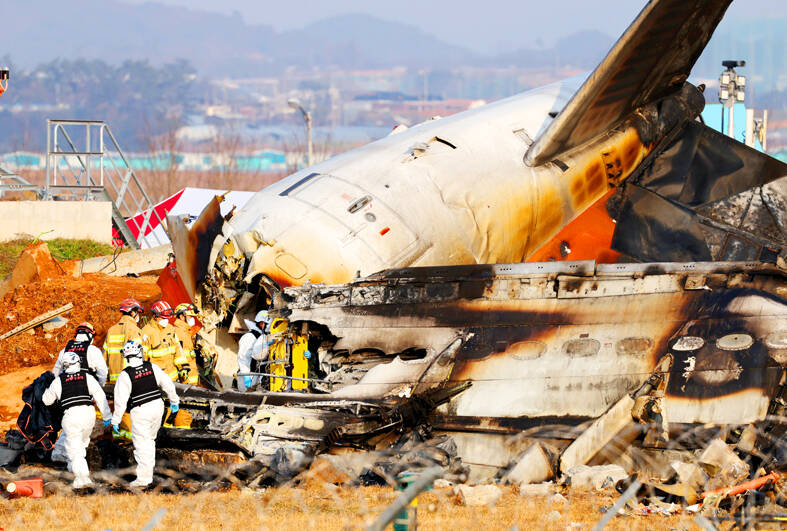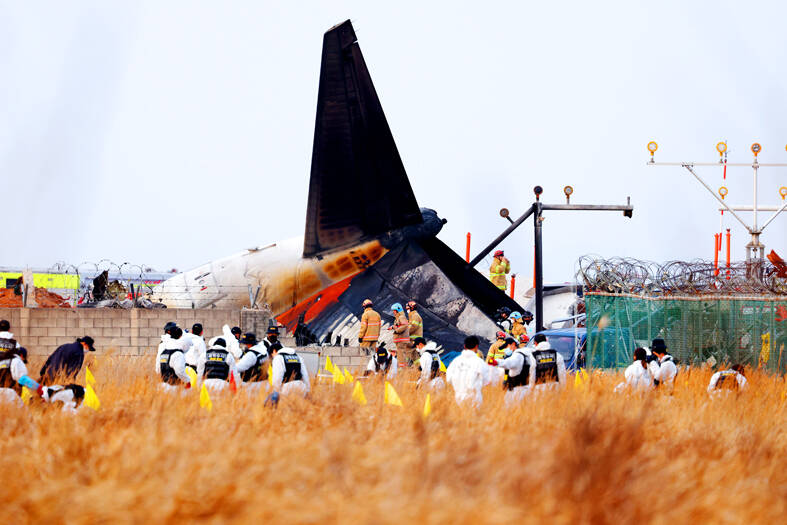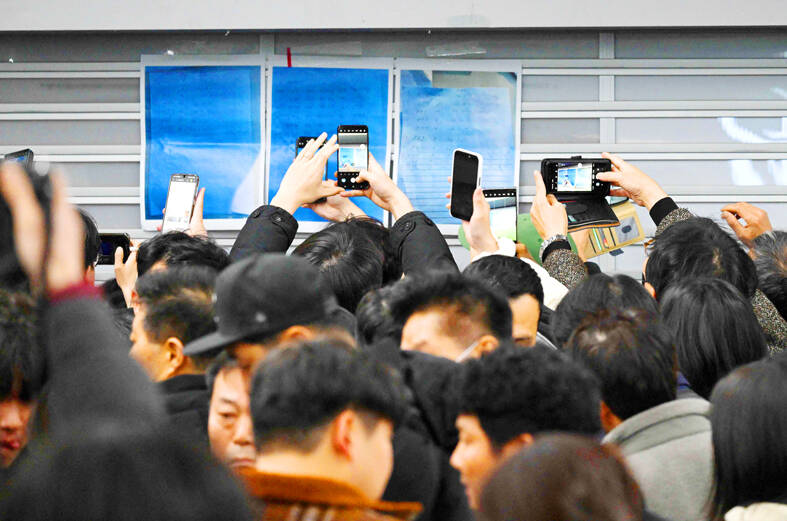At least 177 people were killed yesterday in the deadliest air accident ever in South Korea, where an airliner belly-landed and veered off the runway, erupting in a fireball as it slammed into a wall at Muan International Airport.
Jeju Air flight 7C2216, arriving from the Thai capital, Bangkok, with 175 passengers and six crew on board, was attempting to land shortly after 9am at the airport in the south of the country, the South Korean Ministry of Land, Infrastructure and Transport said.
Two crew members were rescued, and officials have suggested the final two missing people were presumed dead.

Photo: EPA-EFE
The deadliest air accident on South Korean soil was also the worst involving a South Korean airline in nearly three decades, the transportation ministry said.
The twin-engine Boeing 737-800 was seen in a local media video skidding down the runway with no visible landing gear before crashing into the wall in an explosion of flames and debris.
“Only the tail part retains a little bit of shape, and the rest of [the plane] looks almost impossible to recognize,” Muan Fire Department Chief Lee Jung-hyun told a news briefing.

Photo: EPA-EFE
The two crew members, a man and a woman, were rescued from the tail section of the burning plane, Lee said.
They were being treated at hospitals with medium to severe injuries, the head of the local public health center said.
Investigators are examining bird strikes and weather conditions as possible factors, Lee said.

Photo: AFP
Yonhap news agency cited airport authorities as saying a bird strike might have caused the landing gear to malfunction.
Experts said the bird strike report and the way the aircraft attempted to land raised more questions than answers.
“A bird strike is not unusual, problems with an undercarriage are not unusual,” Airline News editor Geoffrey Thomas said. “Bird strikes happen far more often, but typically they don’t cause the loss of an airplane by themselves.”
South Korea’s acting President Choi Sang-mok, in an emergency meeting yesterday evening, declared a national mourning period until Saturday.
Hours after the crash, family members gathered in the airport’s arrival area, some crying and hugging as Red Cross volunteers handed out blankets.
Families screamed and wept loudly as a medic announced the names of 22 victims identified by their fingerprints. Papers were circulated for families to write down their contact details.
One relative stood at a microphone to ask for more information from the authorities.
“My older brother died and I don’t know what’s going on,” he said. “I don’t know.”
Mortuary vehicles lined up outside to take bodies away, and the authorities said a temporary morgue had been established.
Yesterday’s passengers included two Thai nationals, while the rest are believed to be South Koreans, the transportation ministry said.
No Taiwanese were on board, Taiwan’s Ministry of Foreign Affairs said.
The control tower issued a bird strike warning, and shortly afterward the pilots declared mayday and then attempted to land, a South Korean transportation ministry official said.
A passenger texted a relative to say a bird was stuck in the wing, the News1 agency reported. The person’s final message was “Should I say my last words?”
The crash is the worst for any South Korean airline since a 1997 Korean Air crash in Guam that killed more than 200 people, transportation ministry data showed. The previous worst on South Korean soil was an Air China Ltd (中國國際航空) crash that killed 129 in 2002.
In Taipei, President William Lai (賴清德) yesterday expressed his heartfelt condolences on behalf of the government and the people of Taiwan “to the families of those who lost their lives in the crash,” the Presidential Office said in a statement.
Department of East Asian and Pacific Affairs Director Peter Lan (藍夏禮) extended the government’s condolences to South Korean Representative to Taiwan Lee Eun-ho, while Taiwan’s Representative to South Korea Liang Kuang-chung (梁光中) extended the government’s sympathies to Seoul, the Ministry of Foreign Affairs said in a news release.
The Ministry of Foreign Affairs reminded Taiwanese living in or traveling to South Korea to call its representative office in Seoul in case of an emergency at +82-10-9080-2761 or its branch office in Busan at +82-10-4537-7961.
Additional reporting by CNA

AGING: As of last month, people aged 65 or older accounted for 20.06 percent of the total population and the number of couples who got married fell by 18,685 from 2024 Taiwan has surpassed South Korea as the country least willing to have children, with an annual crude birthrate of 4.62 per 1,000 people, Ministry of the Interior data showed yesterday. The nation was previously ranked the second-lowest country in terms of total fertility rate, or the average number of children a woman has in her lifetime. However, South Korea’s fertility rate began to recover from 2023, with total fertility rate rising from 0.72 and estimated to reach 0.82 to 0.85 by last year, and the crude birthrate projected at 6.7 per 1,000 people. Japan’s crude birthrate was projected to fall below six,

US President Donald Trump in an interview with the New York Times published on Thursday said that “it’s up to” Chinese President Xi Jinping (習近平) what China does on Taiwan, but that he would be “very unhappy” with a change in the “status quo.” “He [Xi] considers it to be a part of China, and that’s up to him what he’s going to be doing, but I’ve expressed to him that I would be very unhappy if he did that, and I don’t think he’ll do that. I hope he doesn’t do that,” Trump said. Trump made the comments in the context

SELF-DEFENSE: Tokyo has accelerated its spending goal and its defense minister said the nation needs to discuss whether it should develop nuclear-powered submarines China is ramping up objections to what it sees as Japan’s desire to acquire nuclear weapons, despite Tokyo’s longstanding renunciation of such arms, deepening another fissure in the two neighbors’ increasingly tense ties. In what appears to be a concerted effort, China’s foreign and defense ministries issued statements on Thursday condemning alleged remilitarism efforts by Tokyo. The remarks came as two of the country’s top think tanks jointly issued a 29-page report framing actions by “right-wing forces” in Japan as posing a “serious threat” to world peace. While that report did not define “right-wing forces,” the Chinese Ministry of Foreign Affairs was

PREPAREDNESS: Given the difficulty of importing ammunition during wartime, the Ministry of National Defense said it would prioritize ‘coproduction’ partnerships A newly formed unit of the Marine Corps tasked with land-based security operations has recently replaced its aging, domestically produced rifles with more advanced, US-made M4A1 rifles, a source said yesterday. The unnamed source familiar with the matter said the First Security Battalion of the Marine Corps’ Air Defense and Base Guard Group has replaced its older T65K2 rifles, which have been in service since the late 1980s, with the newly received M4A1s. The source did not say exactly when the upgrade took place or how many M4A1s were issued to the battalion. The confirmation came after Chinese-language media reported